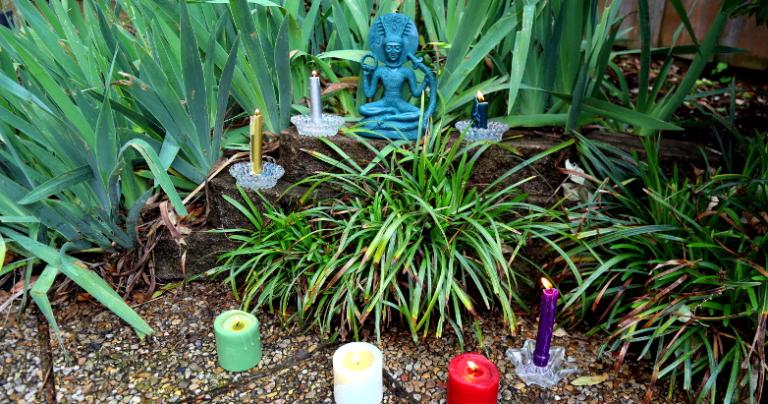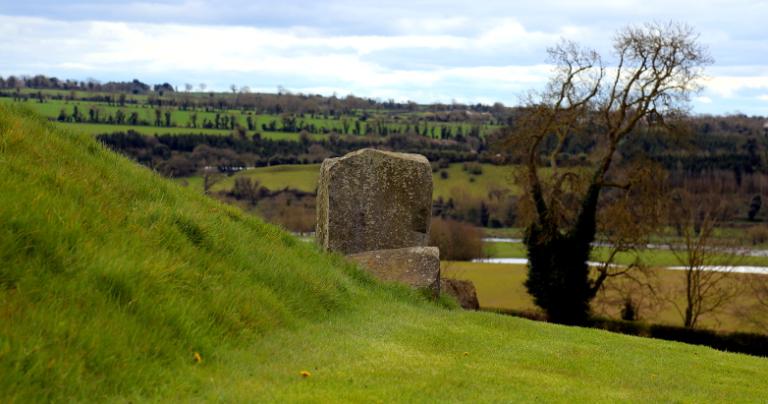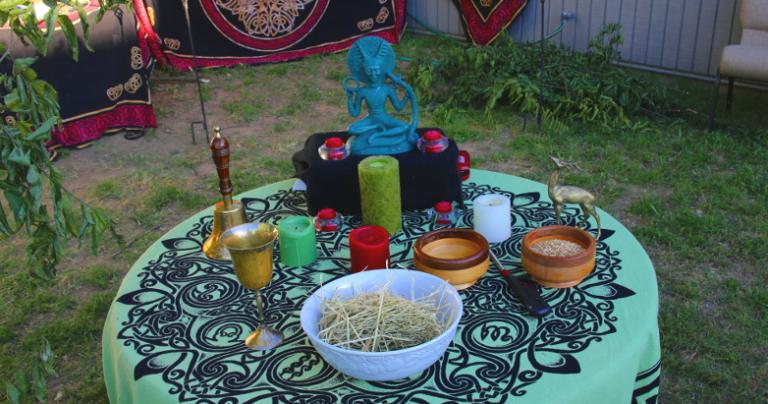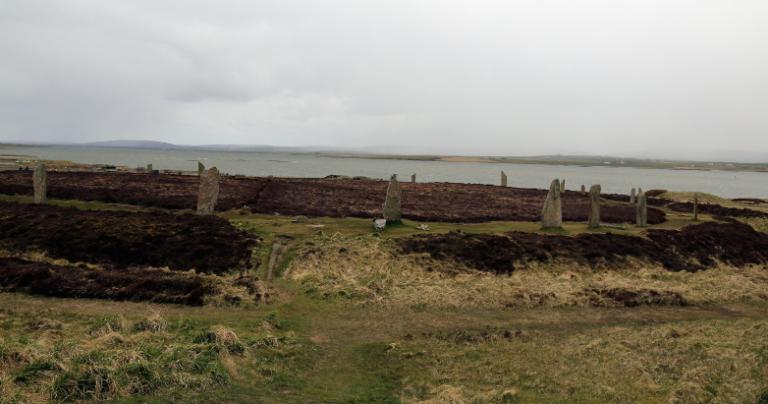For those of us called or claimed by a deity, or those who are seeking a deity, there is no substitute for polytheism. Other religions have their priorities – we would rather experience the Gods, learn to embody Their virtues and values, and become a part of Their great work.
Last year I wrote about Beginning a Devotional Practice: choose a deity, create an altar, pray, meditate, make offerings, and do the other things necessary to form and strengthen a devotional relationship. Many of you have done that. Your practices don’t look exactly like mine, but that’s OK. Different deities call different people to worship Them in different ways.
Now I’m getting questions that ask “OK, I’ve done all that, what’s next?” Part of me is thrilled to see more and more people answering these calls and searching for greater depth. Another part wonders why they’re asking me and not a more experienced priest. But then I remember that very few experienced polytheist priests have a public presence on the internet.
Polytheism isn’t a religion – it’s a collection of many religions. I can’t tell you how to be a better Hellenist because I’m not a Hellenist. I can only tell you what I’ve done, what’s worked, and what hasn’t.
Devotional polytheism isn’t off the map, but it’s at the edges and you can’t go very far without finding yourself in uncharted territory. Those of us have gone deeper have an obligation to draw maps for those who come after us.
This is my attempt to draw a small piece of that map of the territory beyond beginning polytheism.
1. Practice: the same, but more
All-Star basketball players practice free throw shooting every day. Concert pianists practice several hours every day. The Dalai Lama meditates four hours every day. Masters of any art don’t learn the basics and then move on. They keep practicing the basics day after day, year after year. Whatever you’re doing now, do it more – more frequently and for longer periods of time. If there are practices you’re not doing, pick them up at least on a trial basis.
How much is necessary? That depends on what you’re called to do. Most of us with jobs and school and families can’t spend four hours on spiritual practice every day – I certainly can’t. That’s OK – a little more practice will make you a little better polytheist. Most of us aren’t called to become the polytheist equivalent of the Dalai Lama.
But if that is your calling, that’s the level of commitment that’s required.
2. Study: cultural and cross-cultural
Polytheist religions are religions of the Gods, but they are rooted in places and cultures. If you worship Celtic Gods, you need to understand Celtic history and culture. I’ve read books on the history of Ireland, Scotland, and Wales. I’ve read translations of ancient stories. I’ve been to all three countries (which, to be clear, aren’t the extent of the Celtic world). I’ve walked the land and experienced some of the ancient sites. In 2016 I got to see the Celts exhibit in Edinburgh.
The fact that some of my ancestors came here from Ireland 220 years ago is of little importance. I’m an American, and no amount of study and travel is ever going to make me Irish. This isn’t about becoming Irish. It’s about learning how the Gods of Ireland were understood and worshipped in the past. That provides context for our understanding and worship of Them here and now.
We have stories about the Celtic deities, but they weren’t written down till well into the Christian era. We know much less about Their stories and worship than we know about, say, the Greeks. So where we have missing information, we can study the beliefs and practices of better documented neighbors. This becomes the “frog DNA” (to borrow from Jurassic Park) in our practices. Sometimes it works and sometimes it doesn’t, but it gives us a good place to start.
A lot of intermediate polytheism looks like mundane academic study.
3. Listening: finding your place
Prayer – talking to the Gods – is important. So is listening to Them.
Who is speaking to you? What are They calling you to do? Perhaps They’re calling you to priesthood, but don’t jump to that conclusion. Priesthood is a specific set of duties and commitments, and it often looks very different from what Catholic priests and Protestant ministers do. There are many forms of service – priesthood is only one.
Listen for what you’re being called to do. That may take months, or it may take years. Keep listening. When you hear something, confirm it with divination.
What training does it require? What study? Do you need a teacher? If so, where can you find one? A quote often misattributed to the Buddha says “when the student is ready the teacher will appear.” Sometimes that’s true, but teachers tend to appear when you hang out in places where teachers teach on a regular basis.
Or perhaps you don’t need training – perhaps you just need to get to work. Learning by doing is a vastly underrated form of education.
Go far enough and eventually you’ll run out of teachers. But there are always people who are knowledgeable and experienced who can serve as sounding boards, sanity checks, and general resources on topics where you’re still learning. I have several of these people in my life, and I’m thankful for all of them.
4. Consistency and reliability: no excuses
When you’re first starting out, you’re going to make mistakes. You’re going to forget things. You may even consciously make a bad decision. Rarely are there serious repercussions. While obviously I cannot speak for all the Gods, the ones I’ve worked with have been nothing like the God of the Old Testament, looking to smite people for the slightest slipup.
But as your practice deepens, expectations get more serious. The Morrigan asked me for weekly offerings. When I went on vacation a month later, I wondered about my usual obligations and I heard “every week, period.” And so I’ve poured libations into a river in Ireland and into decorative shrubbery in London and in Las Vegas.
At some point, “I was too busy” is no longer a valid excuse. You have daily obligations and you meet them, no matter how busy, how tired, or how uninspired you are.
You may be given a geas – a religious obligation to never eat a certain food, to always wear a particular piece of jewelry, to always respond in a certain way to offers or requests. You may know why you were given that particular geas, or you may not. I have two – they are relatively minor and easy to keep. There may be more. Or not – we will see.
As your practice gets deeper, more will be expected of you, and less tolerance will be shown for failure.
5. The stakes get higher
As your devotional relationship develops, you can try things out, see how they go, and see what responses you get. There are no obligations for either party (obviously, if you’re one of the few who find yourself forcefully claimed, this doesn’t apply to you – I’m genuinely sorry). But do this for long enough and it is likely you will be asked for an oath.
Oaths may be for a fixed period of time: a month or a year or a decade. They may be for life. I know some people who’ve sworn oaths for “this life and beyond” – I’m not doing that. I don’t know what the next life is going to look like and I’ll deal with it when I get there.
You can negotiate terms. You can say no. Unless you can’t. If you haven’t been there, it’s hard to explain. Most deities don’t bother with reluctant devotees – They just move on and find someone else who’s more agreeable. But not always.
Keep going deeper into your devotion and your polytheist practice and you’ll be asked to go deeper still.
6. This isn’t for everyone
This type of practice should not be considered normative for all polytheists. There is – or should be – a place in our polytheist religions and traditions for people who just want to honor the Gods and live an ordinary life. Our movement needs accountants and auto mechanics as much as it needs priests and mystics.
But if you’ve begun a polytheist practice and you’ve found it meaningful and helpful, I encourage you to go deeper – move beyond Polytheism 101. I don’t exactly know where I am, but I like it here. Come on in – the water’s fine.





















